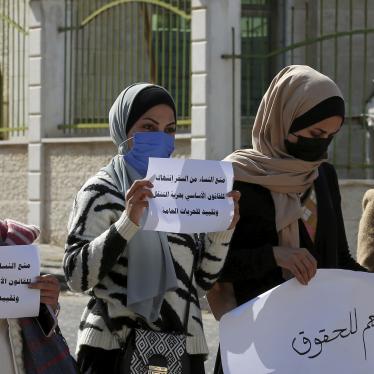(Sanaa) - Yemen should protect women’s rights by ensuring that its new constitution has adequate protections for women, Human Rights Watch said in a letter to the head of the Rights and Freedoms Working Group of its National Dialogue process that was made public today.
Yemen’s National Dialogue was created to bring together all segments of Yemeni society to set the direction for the country’s future, including creating the building blocks for a new constitution. The Rights and Freedoms Working Group is responsible for human rights, including women’s rights. A committee will be created to draft the new constitution when the National Dialogue concludes its work in September 2013, though its end date may be extended. The constitution will be adopted after passage by a national referendum.
“It’s no exaggeration to say that the future of Yemen’s women and girls is going to depend on the Rights and Freedoms Working Group’s efforts on behalf of their rights,” said Rothna Begum, Middle East and North Africa women’s rights researcher at Human Rights Watch. “This is a historic opportunity for Yemen to end the deeply entrenched discrimination against its women in both law and in practice.”
Yemeni women face severe discrimination in all aspects of their lives, Human Rights Watch said. Women cannot marry without the permission of their male guardians; they do not have equal rights to divorce, inheritance or child custody, and a lack of legal protection leaves them exposed to domestic and sexual violence. Yemen has high levels of child marriage, with girls as young as eight forced into marriage.
In its letter to the Rights and Freedoms Working Group, Human Rights Watch set out the key issues affecting women’s rights. Human Rights Watch made a series of recommendations calling on the working group to ensure women in Yemen equal rights, promote their right to equal participation in the political process, and protect them from discrimination and gender-based violence.
The new constitution should have clear and explicit provisions to guarantee women full equality including before the law in accordance with international law and treaties, Human Rights Watch said. The constitution should require positive measures to achieve the full and equal empowerment of women so they can access their rights fully on the same basis as men. It should also prohibit discrimination on the grounds of sex, gender, marital status, pregnancy, or other gender-specific attributes and ensure that all forms of discrimination are prohibited.
The Working Group on Rights and Freedoms should recommend the adoption of measures to specifically address social and cultural impediments to women’s full participation in political life, even where their rights are legally and constitutionally guaranteed and protected, Human Rights Watch said. These could include public awareness campaigns about women’s rights, capacity building for women to take part in civic affairs, and support for women leaders.
Yemen’s new constitution should include provisions that define gender-based violence as a form of discrimination and direct the authorities to take steps to prevent and respond to it. Yemen’s legislature should then enact laws to end all forms of violence against women and girls.
The constitution should also contain a provision affirming that women have equal rights with men to enter into marriage on the basis of their full and free consent, equal rights within marriage and in the case of its dissolution, and equal inheritance rights with men. The personal status law and other laws should be revised to remove all provisions that discriminate against women.
Child marriage, one of the most severe forms of gender discrimination, is common in Yemen. Early marriages may cause girls serious physical and emotional harm, and deny them their education and other opportunities. Yemen should set the minimum age for marriage at 18, Human Rights Watch said.
The National Dialogue began on March 18, over a year after the ouster of President Ali Abdullah Saleh. It involves the participation of 565 people, 28 percent of them women, representing a cross-section of Yemeni society. The dialogue includes discussion over grievances by those in the South who have called for secession as well as in the northern Sa’da region, national reconciliation and transitional justice, state-building, good governance, the role of armed and security forces, the protection of vulnerable groups, rights and freedoms, and development.
Recommendations from the National Dialogue will serve as a basis for drafting a constitution. Following a referendum in which a constitution is approved, general elections will then take place, concluding the planned two-year transitional period.
“Women took part alongside men in Yemen’s uprising,” Begum said. “Members of the National Dialogue have a responsibility to women and girls in Yemen to ensure that their rights are fully protected in the constitution and to see to it that they can live their lives free from discrimination and violence.”







